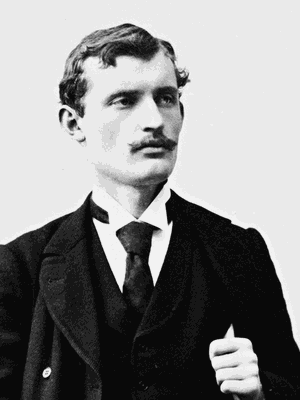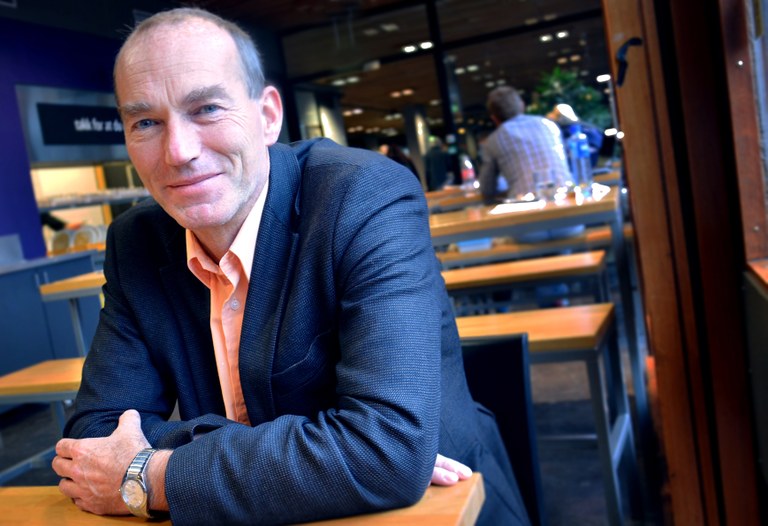Henrik-Steffens-Vorlesungen im Sommersemester 2017
Vom 1. Oktober 2014 bis zum 30. September 2018 war Frau Prof. Dr. Janke Klok Inhaberin der Henrik-Steffens-Gastprofessur (Antrittsvorlesungen). Studentischer Mitarbeiter im Sommersemester 2017 war Sven Kraus.
Europeere - Simen Ekern

Foredraget vil ta utgangspunkt i boken Europeere, utgitt 2015, - som skildrer de politiske konsekvensene av de mange krisene Europa har gjennomlevd de siste årene.
Den vanskelige økonomiske situasjonen har gitt god plass til politiske entreprenører med vidt forskjellige ideologiske prosjekter: I hovedrollene finner vi "patrioter" som vil ta tilbake den makten nasjonalstaten synes å ha mistet i en global verden. Separatister som i stedet drømmer om å bryte ut av nasjonalstaten de tilhører. Euro-utopister, som mener krisen kan være anledningen til å ta det endelige skrittet over til en føderalstat. Nye, kreative populister, som vil kaste eliten ut av sine komfortable kontorer i Brussel og Strasbourg, men også rundt omkring i Europas hovedsteder. Og teknokratene selv, mennene i grå dress som har fått skylden for det meste, men som selv hevder de representerer et godt svar på utfordringene i et samfunn hvor demokratiet er redusert til en skjønnhetskonkurranse der politikere kjemper om å bli likt av velgerne, og horisonten for beslutningene aldri går lenger enn til neste valg.
Den andre delen av foredraget vil lene seg på en bok som skal ut til høsten, en videreføring av "Europeere" som konsentrerer seg om det høyrepopulistiske oppsvinget i Europa. Ideen om nasjonal identitet som en tapt verdi, som fortjener å bli understreket mer, har blitt tydeligere de siste årene. Med utgangspunkt i intervjuer med franske Marine Le Pen, italienske Matteo Salvini og tyske Frauke Petry vil det snakkes om hva slags politiske prosjekter de representerer, og i hvor stor grad de vil være i stand til å prege Europa i årene som kommer.
Norway and the reformation – Prof. Arne Bugge Amundsen

The Lutheran reformation in Norway, formally introduced in 1537, was not prepared either politically or culturally. As a result there was more or less silent opposition against the changes that took place. This opposition lasted for many decades. As late as in the early 17th century some Norwegians had not realized that they belonged to 'a new church'.
In 1537, for the first time in the long period of the three-realm-union in Scandinavia, Norway was regarded as a part of Denmark and not as a separate kingdom. To control Norway, the Danish king Christian III was careful not to challenge everyday culture, but politically it was important for him to establish a new church elite in which he could confide. This strategy introduced a long period of cultural and religious negotiation in Norway - between old and new practices, between rural and urban areas, and between elite and commoners.
The political, geographical and cultural context of the Norwegian reformation made the impact of the changes quite different from many other North European countries.
The past, present and future of the University of Iceland – Prof. Jón Atli Benediktsson

The history of the University of Iceland is inextricably linked to the history of the Icelandic nation in the 20 th and 21 st centuries. When the University was established in 1911, Iceland was an impoverished nation of farmers and fishermen and that first year there were only 45 students, including one woman, and a very limited selection of subjects on offer. The foundation of the University of Iceland was an important factor in the Icelanders' struggle for independence, which was achieved in 1944, and the development of the University over the last decades has been simply incredible.
Today, the University of Iceland is a comprehensive research university with around 13,000 students, including 1,200 international students, and a majority of the student population are women. By educating people to pursue diverse careers and producing internationally renowned scientists and academics, the University of Iceland has played a huge part in the fact that today Iceland is one of the most prosperous nations in the world with strong healthcare and education systems, a healthy democratic tradition and a culture that draws accolades from far beyond the borders of the country.
The population, though, is only around 330,000 and Icelandic speakers would be considered one of the smallest linguistic communities in the world. The digital revolution and rapid technological advances present a huge challenge for the Icelandic language and a great deal of responsibility falls on the University of Iceland, as the most significant centre of learning and research in Icelandic in the world.
Mestermøte mellom Ibsen og Munch – Bergljot Øyrehagen Geist


«Når jeg leser Ibsen, leser jeg ham som meg selv» Edvard Munch og Henrik Ibsen er to av de mest betydningsfulle kunstnere Norge har fostret, og de har begge satt dype spor i verdenskunsten. De møttes, men nære venner ble de aldri. Det var en generasjon mellom dem. De vanket begge på Grand cafe, men ikke rundt samme bord. Munch og hans venner satt ofte og så på Ibsen, der han satt alene bak brillene og foran ham en flaske og et drammeglass. Ibsen fulgte med en viss interesse malerens strev for anerkjennelse. Etter å ha blitt vist rundt i den skandaleomsuste utstillingen på Blomqvistkunsthandel i 1895, sa Ibsen til Munch: «Tro mig, det vil gaa Dem som mig, jo flere fiender jo flere venner.» I foredraget MESTERMØTE sidestilles Munchs bilder med Ibsens dramatikk, slik at deres ulike kunstformer kommer i dialog. Munchs motiver er – på samme måte som Ibsens dramaer – «gennemlevet».
Overheated Identities and the paradoxes of globalisation – Prof. Thomas Hylland Eriksen

This is why questions of identity remain central for an understanding of society. Whereas this lecture mentions rapid industrialisation, the enforced return of migrants, population growth in boomtowns, touristification of local culture and the transformation of Manchester United into a global brand, the main focus is on the current trend of identity politics in the Western world – Trump, Brexit, Islamism, right-wing populism, authoritarian nationalism. Drawing on his books Overheating: An Anthropology of Accelerated Change and Identities Destabilised, the author shows the significance of ‘alternative facts’ and competing regimes of knowledge for an understanding of the present situation.
Norse Revival? Transformation germanischen Heidentums – Prof. Stefanie von Schnurbein,
Adrian Schneider, Björn Griebel, Sven Kraus


Ein Buch- und Filmgespräch, moderiert von Dr. Clemens Räthel.
Obs! Diese Veranstaltung findet im Felleshus der Nordischen Botschaften, Rauchstr. 1, Berlin-Tiergarten statt!
Was haben ein Buch über germanisches Neuheidentum und ein Dokumentarfilm über Studierende, die den norwegischen Pilgerweg von Oslo nach Trondheim erwandern miteinander zu tun? Das über 30 Jahre recherchierte, neu erschienene Buch über Transformationen der religiösen Nordenbegeisterung von 1800 bis heute und die Suche nach einem Glauben auf einem modernen Wanderweg sind höchst unterschiedliche Vorhaben.
Und doch haben die professorale Autorin und die studentischen Filmemacher*innen Gemeinsamkeiten in ihren Interessen und schwer beantwortbaren akademischen aber auch persönlichen Fragen entdeckt. Woher rührt die Faszination an den wissenschaftlich kaum haltbaren Rekonstruktionen eines „germanischen Heidentums“? Wann kippt eine solche Suche nach spirituellem Ursprung und religiöser Erneuerung in politisch und ideologisch problematische Nationalismen? Welche Brisanz entwickeln sie in aktuellen gesellschaftlichen Formationen? Welche Verantwortung ergibt sich daraus?
Ein Gespräch über Buch und Film sucht Antworten auf diese und andere Fragen.
Das Buch ist als kostenlose open access Version unter folgendem Link verfügbar:
Zu dem Film gibt es einen Blog, der die inhaltliche und organisatorische Arbeit dokumentiert, erreichbar unter:
► https://wanderstudent.wordpress.com/
In Zusammenarbeit mit den Nordischen Botschaften und Kulturhus.
Å skriva for dei som ikkje vil lesa – Terje Torkildsen


Alle er einige om at lesing er ein føresetnad for at me skal kunna kommunisera med kvarandre og tileigna oss informasjon. Men Torkildsen hevdar at lesing også gjer oss til rikare og betre menneske. Bøkene hjelper barn og unge til å bli kloke og ansvarlege vaksne. Skjønnlitteraturen, og kanskje særleg romanen, kan gi innsikt i andre menneske sine perspektiv og særpreg på ein måte som ingen andre medium kan.
Skjønnlitteraturen kan også gi ei fellesskapskjensle som strekkjer seg langt utover her og no. Dei som les kjenner seg i slekt med menneske dei aldri har møtt og aldri vil møta, folk frå fjerne himmelstrøk og fjern fortid. Litteraturen fortel noko om kva som er felles for alle menneske, på alle stader og til alle tider. Bøkene fortel oss at me ikkje er åleine.
Luther og reformasjonen i Norge – Aud Tønnessen, Dag Thorkildsen, Hallgeir Elstad
Professor Hallgeir Elstad
Obs! Diese Veranstaltung findet im Felleshus der Nordischen Botschaften, Rauchstr. 1, Berlin-Tiergarten statt!
